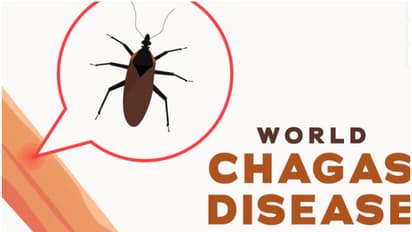Could your home be inviting the 'kissing bug'?

Synopsis
Could your home unknowingly attract kissing bugs? These nocturnal insects may carry Chagas disease, posing serious health risks. Learn how to prevent their entry.
What are kissing bugs?
Kissing bugs, or Triatomine bugs, are named so as they tend to bite people on the face and near the mouth, mostly during sleep. However, they can bite people on other parts of the body as well.
What do they cause?
Kissing bugs are nocturnal, which means they usually bite during sleep by injecting saliva that has anesthetic properties. That’s why the bites don’t hurt, and one may not even know when bitten. The bug typically takes 20 to 30 minutes for feeding, and proteins present in bug saliva can cause allergic reactions.
If there is a mild skin reaction, an anti-itch cream, such as calamine lotion, can help. But some people may develop a severe anaphylactic reaction, which is an absolute emergency and may require hospitalization and systemic corticosteroids for treatment.
In about 50% of cases, kissing bugs carry the parasite Trypanosoma cruzi in their digestive system and spread it through their feces. They acquire this parasite by feeding on humans or animals already infected with T. cruzi. This can lead to an illness known as Chagas disease (distinct from African sleeping sickness). While many infected individuals may show no symptoms, some experience mild flu-like signs such as fever, body aches, rash, and swollen lymph nodes.
However, some may develop complications like cardiomyopathy, dilation of the esophagus (megaesophagus), and colon (megacolon). Such cases need to be treated with antiparasitic agents like benznidazole or nifurtimox.
How do kissing bugs enter the household?
Kissing bugs can enter households through various means, including cracks in walls, holes in screens or window frames, and even through open doors or windows. They are also attracted to lights and the carbon dioxide emitted by humans and animals.
Status of kissing disease in India
Human trypanosomiasis is endemic in both Africa and the United States. With growing international population mobility, however, the infection has since been documented in 44 countries. Although Chagas disease is not endemic in India, a few cases have been reported from rural parts of Nagpur and Gujarat.
Animal trypanosomiasis, however, is endemic in India. Owing to the serious complications that can develop if untreated, creating awareness of the condition is imperative.
Preventive measures
By reducing debris and vegetation accumulation around the home, repairing cracks and gaps, and frequent cleaning of racks and tight spaces in the home, you can prevent kissing bugs from infesting your household.
Every year, World Chagas Disease Day is observed on April 14th, to create public awareness for this little-known disease.
– Dr. Subhashree Samantaray, Associate Consultant, Infectious Diseases, Manipal Hospitals, Bhubaneswar
Explore the latest Lifestyle News covering fashion, wellness, travel, Food and Recipes, and more. Stay updated with trending Health News, fitness tips, and expert insights to inspire your daily living. Discover personalized lifestyle trends that keep you stylish and informed. Download the Asianet News Official App from the Android Play Store and iPhone App Store for everything that adds value to your everyday life.